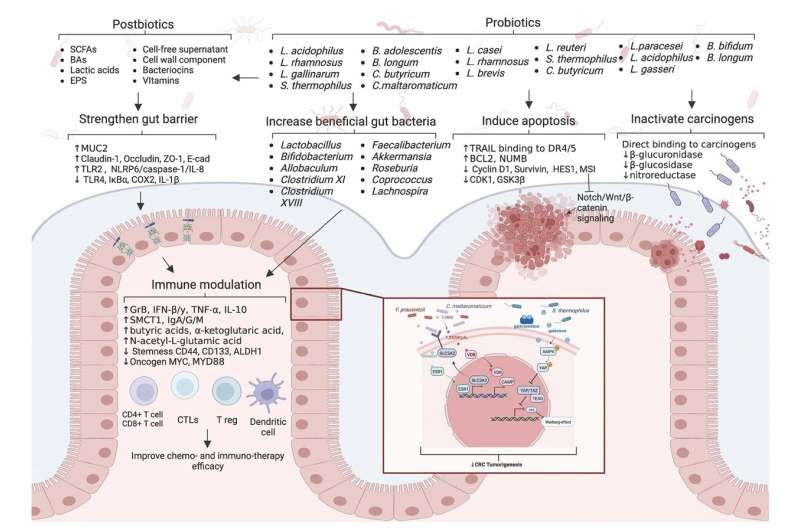by Cactus Communications

Many patients with colorectal cancer (CRC) suffer a poor prognosis, highlighting the need for effective prevention and treatment. In this Chinese Medical Journal review, researchers from The Chinese University of Hong Kong summarize the latest findings on non-invasive CRC prevention and treatment using probiotics. Credit: Prof. Jun Yum, The Chinese University of Hong Kong, Chinese Medical Journal
Colorectal cancer (CRC) is expected to contribute to a burden of 3.2 million new cases and 1.6 million deaths by 2040. CRC prevention strategies target lifestyle changes, screening high-risk individuals, and polyp removal, while the most effective treatment options are surgery and chemotherapy or radiotherapy.
Although early detection is quite feasible, the slow transition from adenoma to carcinoma and the development of drug resistance often render CRC treatment ineffective. Researchers are, therefore, now exploring alternative non-invasive CRC prevention strategies to improve clinical outcomes.
Recently, ‘probiotics’ or live non-pathogenic bacteria that confer health benefits when given in sufficient quantities—have gained attention. With significant advances in probiotic research, we have discovered many of these live microbes that help alleviate disease symptoms and improve therapeutic outcomes. Probiotic intervention also serves as a cutting-edge strategy for CRC prevention.
Now, researchers from The Chinese University of Hong Kong in China looked at the latest literature covering probiotics to distill insights on the traditional and new probiotic interventions and adjuvant therapy for boosting the effects of chemotherapy and immunotherapy. Their review article was published in the Chinese Medical Journal.
Elaborating further, Professor Jun Yu, the corresponding author of the review, says, “Administration of CRC-depleted bacteria as a probiotic intervention may help regulate and create an intestinal microenvironment that is unfavorable to CRC development. Therefore, it is pivotal to identify CRC-depleted bacteria and develop probiotics as a safe, novel, and non-invasive strategy for CRC prevention.”
The authors open by discussing how microbes can be used to prevent CRC. Probiotics were first used against CRC, given their ability to elicit a health benefit as they colonize the intestine and counter the activity of pathogens and disease. When administered appropriately, they enhance the intestinal barrier, modulate the hosts’ immune response, remodel the gut microbial composition, and even induce targeted cancer cell death.
The first-generation probiotics were formulations of lactic acid bacteria (LBA) from Lactobacillus, Lactococcus, Streptococcus, Enterococcus, Bacillus, Saccharomyces, and Bifidobacterium genera. On the other hand, next-generation probiotics (NGPs) incorporate microbes such as Bacteroides fragilis, Clostridium butyricum, Akkermansia muciniphila, and Faecalibacterium prausnitzii.
These have come to the fore following recent advances in genomics, but their underlying mechanisms are still being investigated.
Next, the authors go on to discuss ‘postbiotics.’ Postbiotics are components derived from probiotic bacteria and protect against CRC. They include dead microbial cells, cell components, enzymes, exopolysaccharides, and metabolic products—the most important being short-chain fatty acids.
These anti-CRC agents are in the spotlight as they do not contain live bacteria and have lower risks following consumption. While discussing advances in probiotic delivery systems, the authors emphasize that optimizing the delivery of probiotics can maximize gut-bacteria interactions, target specific regions or cells in the colon, and improve uptake by immune cells that infiltrate cancerous tissue.
The authors further discuss several intriguing mechanisms by which probiotics can prevent CRC. According to the review, probiotics can limit the proliferation of CRC-promoting bacteria in the gut and rebalance the microbial profile. They can prevent the infiltration of harmful pathogens and restore the intestinal mucus barrier.
Probiotics can inhibit tumor proliferation and modulate the balance of anti-apoptotic and pro-apoptotic factors, which decelerate adenoma progression to CRC. They can deactivate carcinogens and mutagens or sequester them for elimination. Moreover, the probiotic bacteria induce a powerful immuno-modulatory effect on the host by preventing the excessive accumulation of pro-inflammatory T-cells and macrophages that support the tumor microenvironment and cancer progression.
Lastly, the authors discuss how probiotics can supplement CRC chemo- and immune-therapy. They can bolster the effects of chemotherapy, overcome chemoresistance caused by Fusobacterium nucleatum, and manage dysbiosis due to drug treatment. As an adjuvant in immunotherapy, probiotics can boost the anti-tumor immune response and improve the efficacy of immunotherapy treatment.
In summary, the review states that the gut microbiome cannot be neglected when treating or preventing CRC. While early detection can reduce mortality, it is not a viable prevention strategy, nor can it eliminate CRC.
Prof. Yu concludes by saying, “Evidence for the anti-cancer effects associated with probiotics administration is accumulating rapidly due to advancements in the fields of metagenomic sequencing and bacterial genome editing technologies, and investigation into NGPs and postbiotics holds great therapeutic potential.”
More information: Suki Ha et al, Probiotics intervention in colorectal cancer: From traditional approaches to novel strategies, Chinese Medical Journal (2023). DOI: 10.1097/CM9.0000000000002955
Provided by Cactus Communications

Leave a Reply